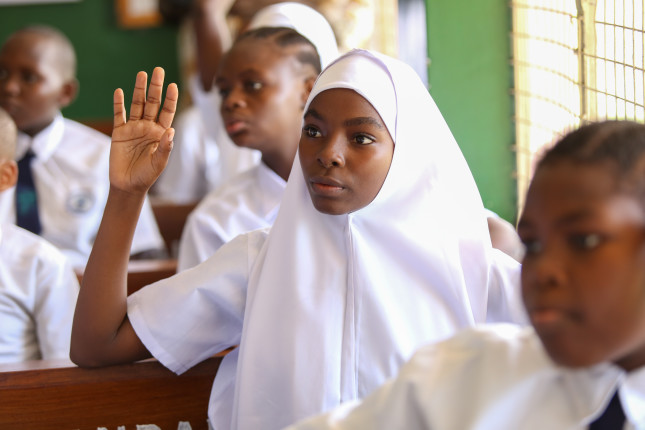-
The Top Dot Mom Posts of 2018 from the Maternal Health Initiative
January 17, 2019 By Benjamin Dills
The five most read posts from the Wilson Center’s Maternal Health Initiative team illustrate how inextricably linked women’s health is to every other aspect of society. Our most popular posts cover maternal and child mortality, faith based engagement in family planning, maternal health in areas of conflict, family planning and the economy, the impacts of caregiving, and Cancer in India.
Our most popular post of 2018, the summary of our event “A More Prosperous World: Investing in Family Planning for Sustainable Economic Growth,” looked at the wider impact of reproductive health services on the economy. “Family planning use directly reduces the risk of maternal death, increases the chances of higher educational achievement, and reduces the share of people below the poverty line,” said Jay Gribble, of Health Policy Plus. Jocelyn Ulrich of EMD Serono, a division of Merck KGaA, Darmstadt, Germany added that there are “significant barriers to women’s health across many areas that are preventing them from fully participating in their economies,” including caregiving, diseases that disproportionally impact women, and lack of access to health services.
Our second most popular post came from our event “Healthy Timing and Spacing of Pregnancies: Faith-Based Engagement in Family Planning.” When discussing the role faith based organizations can play in family planning, Dr. Alma Golden of USAID’s Bureau for Global Health said that faith based organizations are an “irreplaceable asset” for fighting stigma and marginalization and promoting positive health behaviors. “When you enable a family to be able to time and space their children, you actually improve the overall health of that family.”
Transportation infrastructure, and its destruction in times of conflict, has a significant impact on maternal health outcomes and is the focus of our third most popular post. Time is of the essence when a woman enters labor, but for refugees and women in areas impacted by conflict, travel to a health care facility can be delayed or impossible. In some conflicts, ambulances and other health vehicles are targeted, making travel for expectant mothers even more dangerous. To help address this challenge, the UN Refugee Agency is pursuing innovations in refugee camps including community-run taxis for expectant mothers, “waiting homes” close to health facilities, and clean delivery kits for women who may not be able to make it to a health facility when the time comes.
Yuval Cohen previewed the new book, “The Curse of the Kali Yuga: Searching for Meaning and Care for Cancer in India,” by Wilson Center Public Policy Fellow Cecilia Van Hollen, in our fourth most popular post of the year. Women in southern India face stigma and misconceptions that compound the medical challenge of breast and cervical cancer. Many women hide their diagnosis for fear of harming their family’s reputation. The increased incidence of Cancer and other Non-Communicable Diseases is also having an impact on women’s maternal health and global maternal mortality and morbidity rates.
The Costs of Caring: Balancing the Burden of Caregiving for Women and Men, our fifth most read post of the year, summarized our event looking at how unequal expectations of caregiving affect women. Dr. Belén Garijo of Merck KGaA, Darmstad, Germany said, “The act of caregiving has unique impacts on women, in terms of economic, emotional, and physical well-being.” Our panel of experts emphasized that it will take leadership, changes in policy, and a continued increase in male participation to create a cultural change around caregiving.
Here is the complete list of the ten most popular Maternal Health Initiative posts of 2018:
1. A More Prosperous World: Investing in Family Planning for Sustainable Economic Growth by Saiyara Khan
2. Faith in Family Planning: Healthy Timing and Spacing of Pregnancies by Yuval Cohen
3. Driven to Care: Improving Transportation to Reach Maternal Health Care in Conflict Zones by Yuval Cohen
4. Women and Cancer in India by Yuval Cohen
5. The Costs of Caring: Balancing the Burden of Caregiving for Women and Men by Yuval Cohen
6. The 30th Anniversary of the Safe Motherhood Initiative by Sarah Barnes
7. Mothers on the Front Lines: Armed Conflict, Aid Distribution, and Maternal and Child Health by Elizabeth Wang
8. Dr. Belen Garijo: “I Believe We Need To Do Better” For Caregivers Across The World by Yuval Cohen
9. Too Little Too Late: Violence Disrupts Maternal Health Care in Conflict Settings by Yuval Cohen
10. Saving Lives: Focusing on Outcomes to Improve Maternal and Newborn Healthcare Quality by Isabel Griffith
Photo Credit: Students at Zanaki Primary School in Dar es Salaam, Tanzania, March, 2017, courtesy of The World Bank.
 A Publication of the Stimson Center.
A Publication of the Stimson Center.



